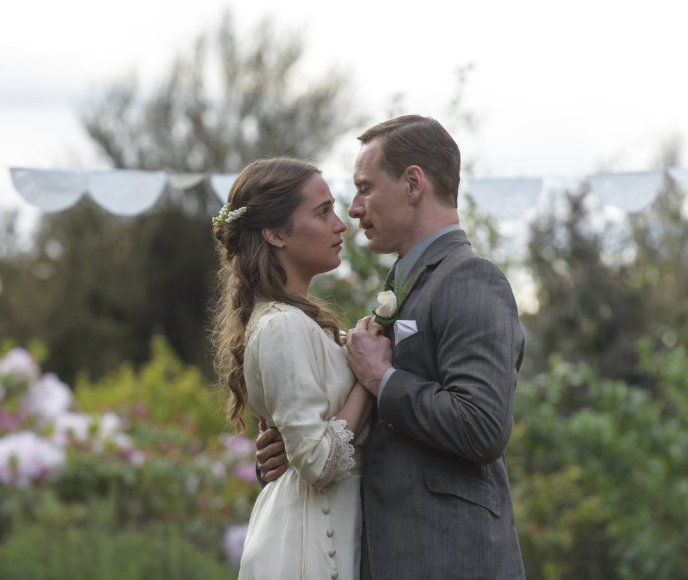The Light Between Oceans is a sweeping period romance based on T.L. Stedman’s novel of the same name. The story takes place on the remote, bleak Australian island of Janus where the crashing waves and sparsely-vegetated land possess an otherworldly beauty that the film itself carries throughout. Alexandre Desplat’s rich score seems to ebb and flow with the waves that hit Janus’s shores and the passion of the two main characters. As Tom Sherbourne explains to his wife Isabel, Janus is named after the Roman god of doors, passages, transitions, time, beginnings and ends. The god was often portrayed with two heads, one facing the future and one toward the past. Just like the Roman god Janus, the tragic events that take place on the island leave characters and viewers alike torn between the past and the future.
Starring Academy Award nominee Michael Fassbender and Academy Award winner Alicia Vikander, the film follows the story of Sherbourne (Fassbender), a lighthouse keeper and World War I veteran, and Isabel (Vikander). After struggling to have a child of their own, Isabel convinces Tom to raise a baby that washes up on Janus in a small boat with a dead man. Their decision to raise the child as their own puts both characters and the love they have for one another at risk.
Fassbender gives an understated, reserved performance as the WWI veteran. Closed-off and numb after four years in the war, Tom seeks to escape the senseless violence of civilization as a lighthouse keeper on the isolated island. Although reserved, Tom’s pain is clear beneath his quiet demeanor. Fassbender does a marvelous job subtly portraying Tom’s changing attitude as he comes to express his love toward Isabel and as they both come to love their new “daughter.” Fassbender is keenly able to portray Tom’s discomfort with lying about the baby and the body without being overtly sensational.
The onscreen chemistry between Fassbender and Vikander is electric. Viewers are instantaneously swept up into their whirlwind romance. Both actors are able to convey the message that even in a relationship with great passion, there always remains some unknowable facets in a partner and in a relationship. Alicia Vikander’s remarkably emotional performance as Isabel Sherbourne supplements the depth of their partnership. Originally portrayed as an optimistic young woman despite the death of both of her brothers in the war, Isabel’s fiery spirit lurks underneath the surface. She spirals into a depression after two miscarriages, and the pain of her past and present make Isabel seem ripe to explode. Vikander takes viewers with her during these harrowing experiences, and the profound sense of loss she undergoes after she loses her babies. Her joy upon finding the baby who washes ashore soon after her second miscarriage almost is blinding to the wrongdoing of lying that the baby is hers. Vikander’s ability to display her love and devotion to the child makes it almost believeable that the child truly is a Sherbourne.
In the second half of the film, the plot does seem to become overly dramatic and drawn out, specifically Tom’s stint in the county jail where he tirelessly refuses to give up his wife. The discovery of the child’s biological mother, Hannah Potts (Rachel Weisz), leads a guilty Tom to break his secret with his wife and divulge enough hints about the child to lead to an investigation. This gives a glimpse into Vikander’s volatility as Isabel reels after the loss of the child she has raised for the past four years. Although present in the novel, the epilogue at the end of the film feels unnecessary and even tawdry. However, it is a strong reminder that Tom and Isabel’s experiences in the past, whether it be what Tom did in the war or why Isabel chose to keep the child, cause ripples years into the future and cannot be forgotten. The better conclusion, albeit the fan favorite, would have been Tom and Isabel’s reunion after all they have endured.
Despite any shortcomings due to its overly dramatic nature in the tension and unravelling of Isabel’s lie, The Light Between Oceans remains a gorgeous, compelling film. Themes of loyalty, moral ambiguity, and grief ground the plot and enrich the film overall. Most prominent is director Derek Cianfrance’s (Blue Valentine, The Place Beyond the Pines) choice to portray the endurance of love, whether that be romantic love or love for a child. The film shows that despite the inevitable tangle of the past and present, a person has the power to shape his or her life.





